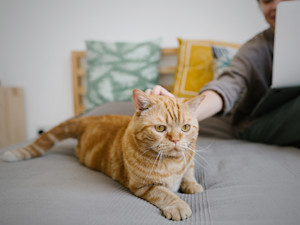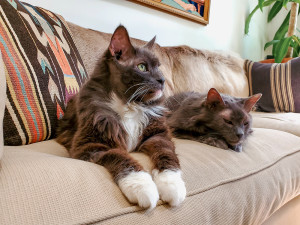Does Your Cat Have Dementia?
And what can you do about it?

Share Article
In This Article:
Can Cats Get Dementia? What Age Do Cats Get Dementia? Cat Dementia Signs Can Cat Dementia Be Treated?
It’s inevitable that your senior kitty will start to show signs of their advancing age over time. Maybe they can’t jump on top of the fridge anymore, approach the speed of light when chasing their favorite toy, or they sleep most of the day. Some changes are to be expected with age.
There also are many medical problems that can arise in senior kitties and contribute to changes in their activity level and overall behavior. But how can you tell if your cat has dementia? The first step is to rule out underlying medical conditions that could be the cause for these changes. The next step is to look for some of the specific signs that fit with cognitive decline. Read on to learn more about what dementia looks like in cats.
Can cats get dementia?
Cats can develop dementia and it closely resembles both the physical and behavioral changes seen in humans with Alzheimer’s disease. In cats, we refer to these changes as cognitive dysfunction. Some of the classic signs of dementia in cats include: staring into space for long periods of time; waking up more often at night; crying or meowing incessantly; getting “stuck” in places they can easily get out of; and seeming to forget things they knew, such as where certain things are in the home or what certain cues mean.

While cognitive dysfunction has not been as well-studied in cats compared to humans, there is a lot we know about identifying cats with these changes and how to improve their quality of life.
What age do cats get dementia?
Signs of dementia are most common in cats that are ten years old and older. However, it is possible to see these changes earlier in some cats. Senior cats also frequently suffer from other medical ailments like hyperthyroidism, kidney disease, high blood pressure, or arthritis. These conditions can also affect their behavior and can show some similarities to cognitive dysfunction.
It is also important to note that cats of any age can develop changes in their behavior or cognitive abilities for many other reasons including certain infections, head injuries, toxins, liver disease, brain tumors, and more. Any cat that is showing sudden changes in their behavior, especially when it is accompanied by other signs of illness, should see a vet right away for a thorough medical workup.
Cat dementia signs
Cats with cognitive dysfunction often have a collection of behavioral changes. It is important to note that many of these changes can also be attributed to other health problems associated with old age. Be sure to rule out other medical conditions first if your cat is displaying these signs. This includes:
Confusion: Cats may seem to stare off into space for long periods of time, get lost in familiar spaces, forget cues they used to know, or stop recognizing certain familiar people or pets.
Aggression or other mood changes: Cats with cognitive dysfunction may have shifts in their personality including increased aggression. Other times, very shy cats may become more outgoing.
Litter box problems: You may notice your senior cat is no longer using the litter box at all, or is no longer covering their waste in the litter box.
Appetite changes: Cats with cognitive dysfunction may experience either an increase or a decrease in appetite.
Increased meowing and crying: These cats often vocalize incessantly, without a specific motivation and can be very hard to redirect.
Different sleep patterns: Cats with cognitive dysfunction are often awake for longer periods of time during the night, which usually coincides with their excessive meowing or crying. They may sleep for much longer periods of time during the day as well.
Increased anxiety: Some cat parents report increased signs of anxiety in their cats with cognitive dysfunction. This may be a reflection of their increased vocalizations and night-waking, or may present as other signs of clinginess or fearfulness.
Reduced self-grooming: These cats will often groom themselves less often or not at all. They may develop dry or matted fur as a result.
Can cat dementia be treated?
Unfortunately, there is no cure for cognitive dysfunction in cats, but there are steps you can take to manage your cat’s symptoms and improve their quality of life. This includes:
Stimulate their mind: Cats of all ages need lots of mental enrichment to keep their minds sharp and prevent boredom. For older cats, this is an important way to keep their minds engaged.
Avoid changes to the environment: Older cats thrive on a predictable routine. Keep their food, bed, and litter box in the same place and try to stick to the same schedule for feedings and other activities. It will take your senior cat much longer to adjust to sudden changes, especially if they have cognitive dysfunction.
Add ramps and stairs: Many senior cats suffer from arthritis and decreased mobility. This affects their ability to jump and climb and this may be more pronounced in senior cats with cognitive dysfunction. Ramps and extra steps can help your cat get to their favorite spots and prevent falls and other injuries.
Improve litter box accessibility: In general, senior cats may have more difficulty jumping or climbing in and out of the litterbox. This is especially the case for cats with arthritis or cognitive dysfunction. Try to make their lives easier by using a litter box with low sides and remove the top if you have one. This way, they don’t have to maneuver so much to get in and out. You may also want to add additional litter boxes, or put protection around the boxes for the times when they don’t quite make it into the box.
Nutritional supplements: Antioxidants, omega-3 fatty acidsopens in new tab, and S-adenosyl-l-methionine (SAM-e), are all being studied for their protective effects on the brain. These supplements are likely to work best as preventatives and early in the disease to slow its progression. Be sure to use supplements intended for cats to avoid ingredients that are toxic and speak to your vet first.
Prescription medications: Some cats with cognitive dysfunction will benefit from prescription medications to help with specific signs of dementia like night-waking, decreased appetite, or increased anxiety. Be sure to speak with your vet if you believe your cat could benefit from one of these medications.
When to seek expert help
Senior cats should always have routine medical care and check-ups every six months. This is because as they age, they are more likely to develop certain medical conditions. Frequent check-ups give your vet the chance to monitor them for common ailments of age including arthritis, kidney disease, hyperthyroidism, high blood pressure, hearing impairment or decreased vision.
All of these conditions can lead to behavior changes on their own, or may compound the signs of cognitive dysfunction. It is also important to see your vet any time you notice sudden changes in your cat’s behavior, appetite, weight, litter box habits, or specific signs of illness. Senior cats are especially fragile and the earlier you can catch these changes, the better.
Bottom line:
Cognitive dysfunction, or dementia, is most commonly an ailment of senior cats age 10 and older.
Senior cats often develop many other health problems that can cause changes in their behavior or health.
While there is no cure for cognitive dysfunction, there are many ways you can support your kitty and ensure they have a good life.
References
Cerna, P, et al. “Potential causes of increased vocalisation in elderly cats with cognitive dysfunction syndrome as assessed by their ownersopens in new tab.” Animals, vol. 10, no. 6, 2020, pp. 1092.
Chambers, J, et al. “The domestic cat as a natural animal model of Alzheimer’s diseaseopens in new tab.” Acta Neuropathologica Communications, vol. 3, no. 78, 10 December 2015.
Cognitive dysfunctionopens in new tab. Cornell Feline Health Center. 2024.
Landsberg, G, et al. “Cognitive dysfunction in cats: a syndrome we used to dismiss as ‘old ageopens in new tab’.” Journal of Feline Medicine and Surgery, vol. 12, no. 11, 1 November 2010, pp. 837-848.

Dr. Amy Fox, DVM
Amy Fox, DVM is a small animal veterinarian in New York City with over thirteen years of experience in a mixture of general practice, emergency medicine, and shelter medicine. A lifelong animal lover, Dr. Fox studied biology in college and then worked as a veterinary nurse before pursuing veterinary school at Cornell University. Her expertise includes surgery, dentistry, and management of chronic conditions, and she is interested in toxicology, pain management, nutrition, care of senior pets, and educational outreach. Dr. Fox also enjoys writing about veterinary medicine and teaching, and her work has previously appeared in Spruce Pets. In her free time, she loves to cook, garden, go for long runs, and hang out with her goofy mixed-breed dog May, who provides never ending comic relief!
Related articles
Does My Cat Need Joint Supplements?
Your cat might just need a little boost to be back to their active self.
![A senior cat is held in their owner's lap]()
How to Care for Your Senior Cat
From taking them to the vet more often to giving them a hand with grooming, older kitties need a little extra TLC.
![Two senior cats laying on a couch]()
Why Senior Cats Make the Best Roommates
Kitten, please! I adopted a couple of seniors because cats, like wine, only get better with age.
Why Does My Cat Poop Outside of the Litter Box?
The worst kind of surprise.
![Happy stylish latino queer person looking comfortable on porch steps with gray cat.]()
Cats Lifespan: How Long Do Cats Live? And What to Expect
They are the absolute light of your life. Here’s how you can help them live as close to forever as possible.
![Cat eating out of a red bowl]()
Does Your Diabetic Cat Need a Special Diet?
Get ready for a sigh of relief — this food doesn’t have to be pricey.








